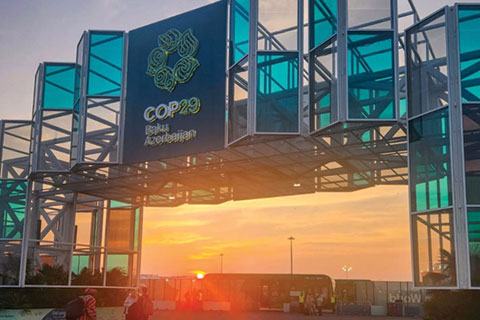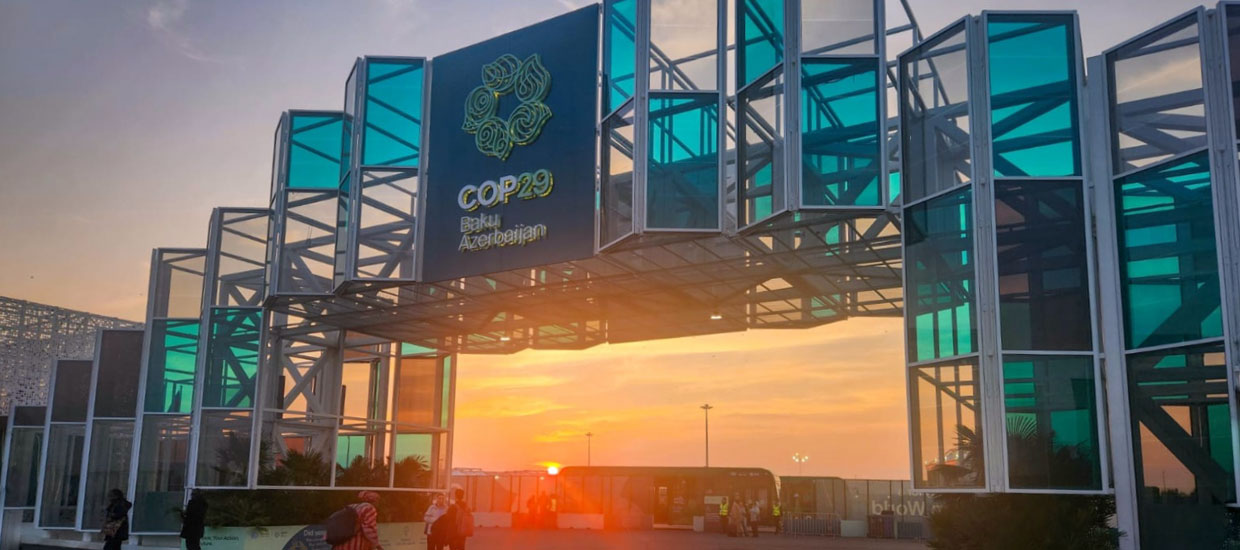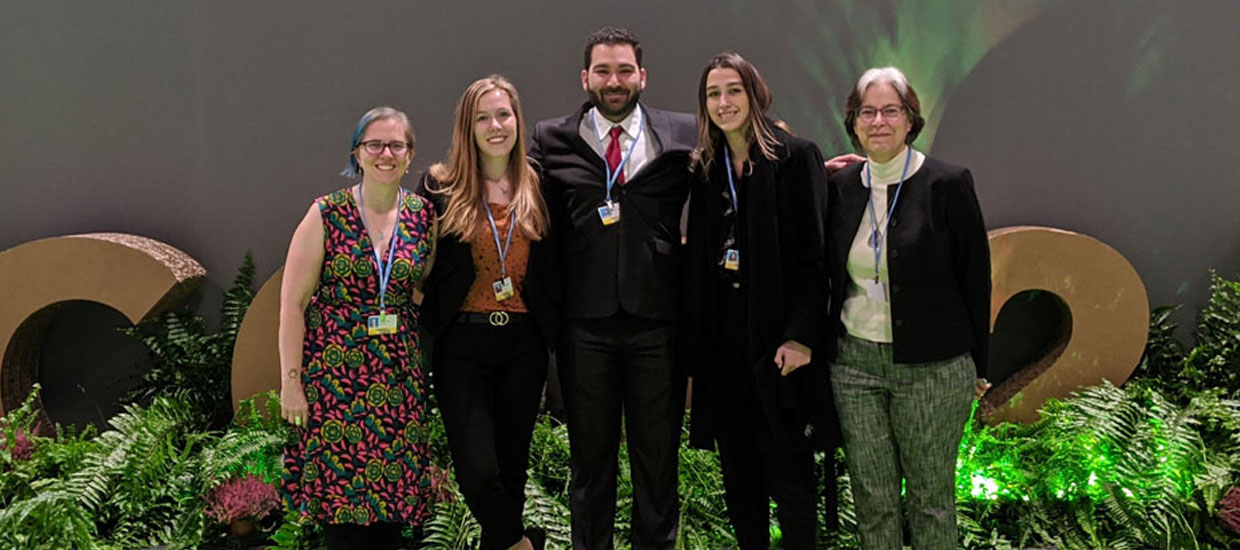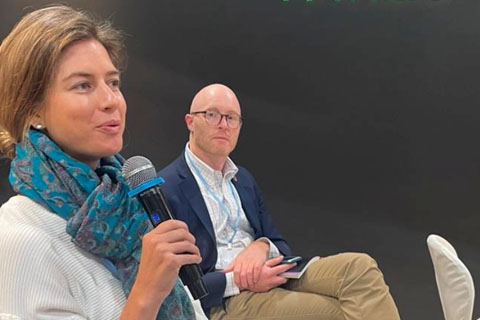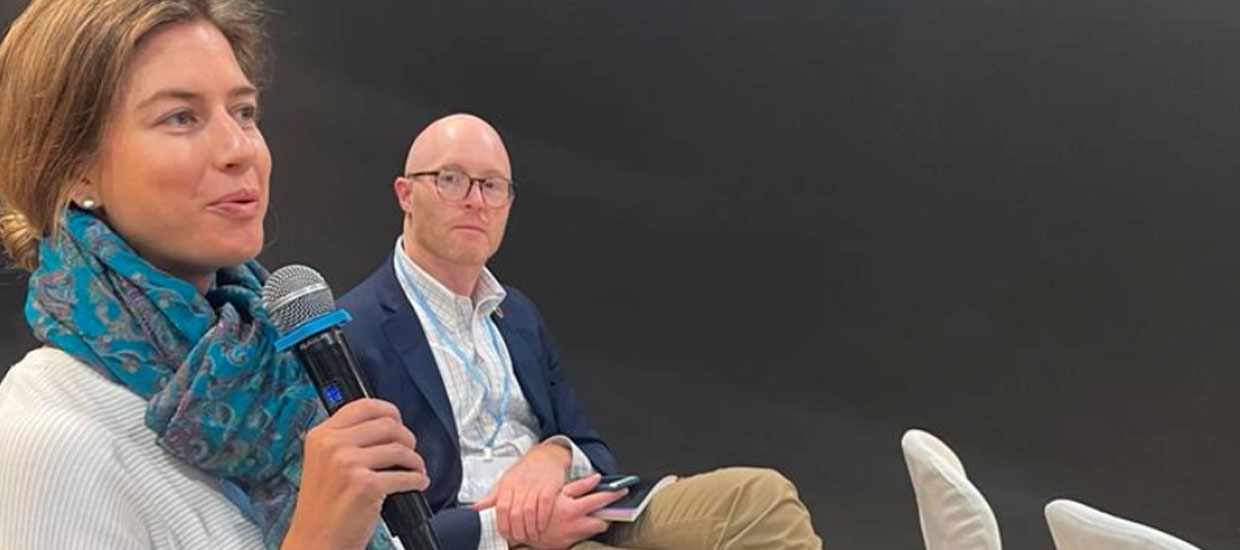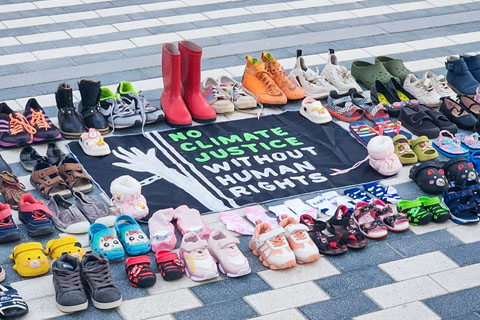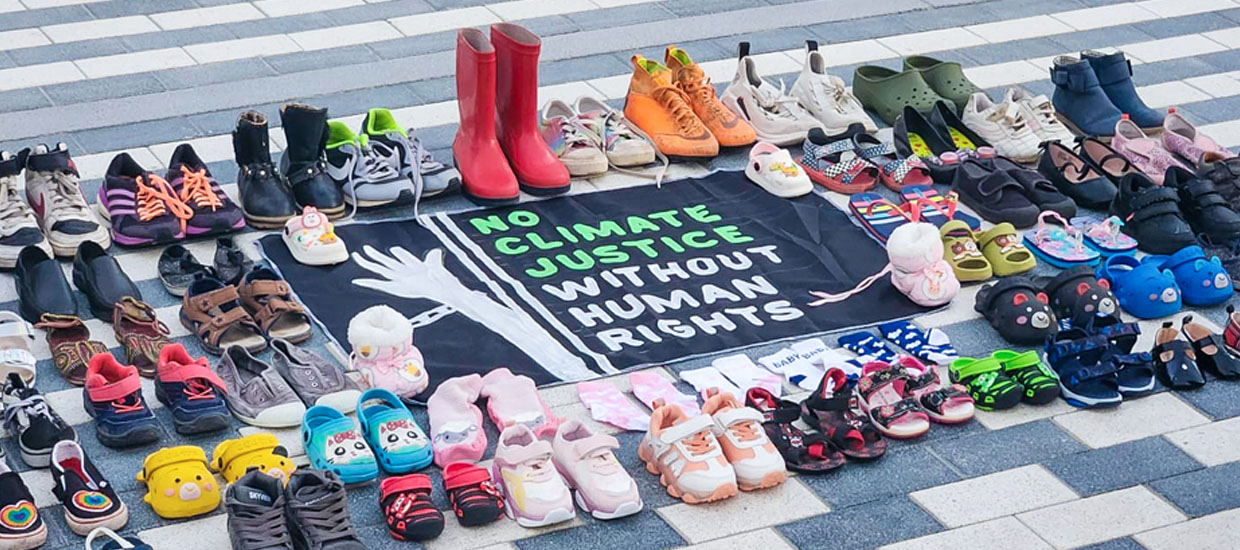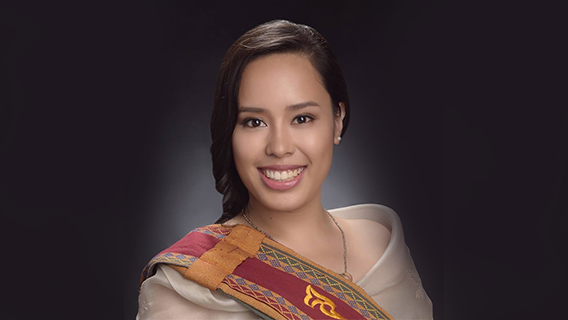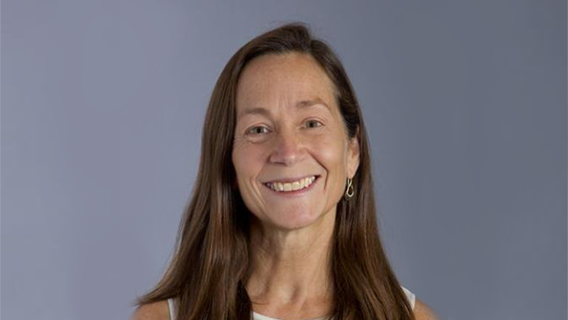Dispatches from the Ground
University of Miami Delegation Makes a Difference at COP29 – Prof. Jessica Owley
COP Preparations – November 10, 2024
For two weeks, government representatives from around the world are gathering in Baku, Azerbaijan, for the 29th Conference of the Parties (COP29) to address climate change. This year’s focus is on advancing the Paris Agreement goals and financing the necessary actions. Building on previous successes, students and faculty from UM will present research, support small island delegations, and work with partners from Miami-Dade County and environmental NGOs. The UM delegation is coordinated by Professor Jessica Owley and Climate Law Fellow Valerie Fajardo, with a team of law students and an engineering PhD student. Visiting Professor Tracy Bach, an expert on international climate law, helped prepare the students.
Working with Small Island Nations
Six JD students support the Federated States of Micronesia (Alyssa, Dursun, Patrick for week one; Justin, John, Quinten for week two). Two JD students (Jayson for week one, Kyra for week two) support Samoa. Small island nations are among the hardest hit by climate change but often have small delegations due to funding constraints.
UM Students with the Micronesian Delegation (L-R): John Dennis, Justin Alexander, Joshua Pangelinan, Lucille Apis-Overhoff, Tara Shaniah Arnold, Valerie Fajardo, H.E. Amb. Jeem Lippwe, Mahoney Mori, Quinten Smith
At COP29, students assist long hours by tracking negotiations and performing research tasks.
Supporting NGOs
Two students work with nonprofit organizations:
- Lorena (SJD student) supports the Center for International Environmental Law (CIEL), focusing on human rights, gender, and carbon markets.
- Kyle Spohn (JD student) partners with Aksyon Klima Pilipinas (AKP), the largest climate action civil society network in the Philippines.
Environmental NGOs like CIEL and AKP keep stakeholders informed and push negotiators toward stronger mitigation and adaptation policies.
Bridging Local and International Efforts
PhD student Danielle Bejar supports the Miami-Dade County Office of Resilience, summarizing events and fostering collaborations for the world’s first Heat Officer, Jane Gilbert. Local governments are crucial in climate action but lack official roles at treaty negotiations. UM’s partnership with the county continues from COP28 in Dubai.
UM students and faculty contribute to global climate efforts while gaining unique learning experiences, witnessing negotiations, developing skills, and building networks as future climate leaders.
COP29 Daily Dispatches
Lights Out and Early Agenda Fight – Renee Valerie Fajardo
Day 1 – November 11, 2024
The conference opened emphasizing climate finance. COP29 President Mukhtar Babayev urged ambitious action on the New Collective Quantified Goal on Climate Finance (NCQG). The plenary was suspended due to disagreements on agenda items, especially the Global Stocktake (GST). Late in the evening, discussions resumed with plans for further consultations.
Negotiations on NCQG – Alyssa Huffman
Day 2 – November 12, 2024
Three years of negotiations prepared the NCQG framework, but it is insufficient and unbalanced. Parties disagreed on whether to build off the existing text or create a new framework. The biggest disputes involve the definition of climate finance and the role of private sector involvement. Negotiators face long nights to draft a workable framework for an ambitious NCQG.
Adaptation and Small Island States – Jayson Fry
Day 3 – November 13, 2024
Adaptation discussions highlight the urgent challenges facing Small Island Developing States (SIDS). Rising seas, storms, and ecosystem degradation make adaptation essential for survival. SIDS stress that adaptation funding is critical, and developed nations must support vulnerable regions.
Oceans and Pacific Island Delegates – Dursun Ersoz
Day 4 – November 14, 2024
Oceans received attention at pavilions and side events. Delegates highlighted the impacts of climate change on livelihoods, coral reefs, and fisheries. Nature-based mitigation, such as mangrove and coral reef preservation, is crucial but under-resourced.
Funding Climate Technology – Patrick Roesser
Day 5 – November 15, 2024
The Poznan Strategic Programme on Technology Transfer (PSP) supports developing countries in climate tech development and transfer. Discussions continue on funding, priorities, and processes. While negotiations are slow, events provide hope with examples of green technology adoption and knowledge sharing.
Article 6.4 Rules and Indigenous Rights – Lorena Zenteno
Day 6 – November 16, 2024
Controversial rules on carbon markets were adopted without proper debate, risking Indigenous rights and environmental integrity. Robust safeguards and inclusive governance are necessary for just climate solutions.
National Adaptation Plans – Quinten Smith
Day 9 – November 19, 2024
Discussions on National Adaptation Plans (NAPs) were deferred to June 2025 due to focus on the NCQG. Funding is a central challenge, and Parties hope a strong NCQG can support NAP implementation.
Energy-Efficient Cooling – Danielle Bejar
Day 9 – November 19, 2024
The Global Cooling Pledge promotes energy-efficient cooling as both mitigation and adaptation. Miami-Dade County was recognized for its participation, showing hope in the margins of COP29 despite stalled adaptation finance negotiations.
Technology Implementation Programme – John Dennis
Day 10 – November 20, 2024
The TIP, created under the Paris Agreement, supports developing countries’ adaptation and mitigation. COP29 advanced the creation process but will continue details at the next COP.
Loss and Damage – Kyle Spohn
Day 10 – November 20, 2024
Negotiations on the Warsaw Implementation Mechanism (WIM) stalled. Developing nations seek ambitious improvements to hold the Global North accountable, but little progress was made.
NDCs – Kyra Frank
Day 11 – November 21, 2024
Nationally Determined Contributions (NDCs) are central to the Paris Agreement. COP29 deferred discussions on NDC features to COP31 due to deep disagreements over ambition, guidance, and timing.
Chairing Negotiations – Justin Alexander
Day 11 – November 21, 2024
Effective chairing is essential in multilateral climate negotiations. COP29 negotiations, particularly on finance, were slow and contentious, highlighting the challenge of balancing developed and developing country priorities.
Participating Students
Justin Alexander
A 3L/Traurig LLM in Real Property Development student. He is from New Port Richey, Florida, and earned a B.S. in Urban Planning and Design from Rutgers University in New Brunswick, New Jersey. Justin is currently a Fellow with the University of Miami School of Law Environmental Justice Clinic. Justin was previously a Food Justice Intern with the Environmental Justice Clinic during the 2023-2024 academic year and a summer associate at Heise Suarez Melville, P.A., during the summer of 2024. Justin has also clerked for the Division of Florida Condominiums, Timeshares, and Mobile Homes. Justin is an Articles and Comments Editor for Volume 15 of the University of Miami Race and Social Justice Law Review and a member of the Charles C. Papy, Jr. Moot Court Board.
Danielle Bejar
A PhD student from the University of Miami College of Engineering. She holds a bachelor’s degree in mechanical engineering from Johns Hopkins University and a master’s in ocean engineering from the University of Miami. Her current projects focus on energy efficiency in HVAC systems, developing innovative ways to deliver thermal comfort to a space while decreasing a building’s energy consumption. Aside from her PhD work, she is involved with a coral bleaching solutions project with the National Marine Sanctuary Foundation, discovering mechanical ways to alleviate a biological problem. Her attendance at COP29 is motivated by her interest in the collaboration between policy and engineering. Danielle serves as an example of the interdisciplinary work for climate change mitigation and adaptation. As she continues to build her technical expertise, she understands the need for organized communication and coordination between groups to propel solutions forward.
John Dennis
A third-year law student at the University of Miami School of Law. Before attending law school, he received a Bachelor of Arts in Geosciences from Hamilton College in Clinton, New York. He currently serves as an Articles & Comments Editor for the University of Miami International and Comparative Law Review. In addition, he is a member of the Environmental Law Society. He is interested in pursuing a career in energy and natural resources law, with specific focus on law and policy related to effective, efficient, and sustainable energy systems. At the 29th Conference of the Parties (COP), he is interested in learning more about the discussions and negotiations that nations are engaged in relating to balanced transitions towards renewable energy sources, including the geopolitical and nation-specific factors that must be taken into consideration.
Dursun Ersoz
A Juris Doctor candidate at the University of Miami School of Law, anticipating graduation in May 2026. He also holds a Bachelor of Science, magna cum laude, in Marine Transportation from the State University of New York Maritime College, and another Bachelor of Science in Maritime Transportation and Management Engineering from Istanbul Technical University Maritime Faculty.
Dursun's professional journey showcases a strong connection to the maritime industry and environmental concerns. He is currently a Legal Intern at the United States Coast Guard Seventh District Legal, focusing on maritime law enforcement and military law. His past roles include Logistics Project Manager at Royal Caribbean Group, where he oversaw logistical plans for dry docks, and a Marine Surveyor at the National Cargo Bureau, Inc., conducting inspections and surveys related to hazardous materials and ship conditions. Dursun's motivation for attending COP stems from his deep understanding of the maritime sector and its intersection with climate change. His areas of interest include sustainable shipping practices, reducing emissions from maritime activities, and legal frameworks for addressing environmental challenges in the maritime domain..
Kyra Frank
A third-year law student at the University of Miami School of Law with a concentration in Environmental Law. She attended the School of Environmental and Biological Sciences at Rutgers University - New Brunswick for her undergraduate education where she studied environmental policy and philosophy. While in law school, Kyra has taken courses in environmental and land use law with a focus on environmental justice in land use decision making. During her second year of law school, Kyra was a member of Miami Law's team for the National Environmental Law Moot Court Competition at Pace University and an intern in the Environmental Justice Clinic. She is attending COP to gain a better understanding of the process of international environmental law-making and opportunities to further environmental justice goals within that process.
Jayson Fry
Earned his B.S. in International Affairs from Florida State University and is currently a J.D. candidate at the University of Miami School of Law. He is a junior staff editor on the Inter-American Law Review and serves as the IBA representative for the International Law Society, where he actively promotes engagement with international law and policy. Additionally, he interns at the Miami-Dade County Office of Resilience, conducting legal, regulatory, and policy research on key areas such as energy, land use, zoning, water management, and procurement, all with a focus on climate adaptation and sustainability. Jayson is particularly passionate about addressing the global challenges posed by climate change. His desire to attend COP29 stems from a commitment to engage in international discussions on climate resilience, adaptation, and sustainable development. By participating in COP29, he aims to further deepen his understanding of global climate policies, connect with experts and advocates, and bring back valuable insights to inform his work on local and national climate strategies.
Alyssa Huffman
A third-year law student in the Environmental Law Program. She received her B.S. in Marine Science and Biology from the University of Tampa. She is interested in multilevel governance, subnational climate efforts, and the social and cultural norms that influence the formation of climate policy. Alyssa is currently a student fellow in the Environmental Justice Clinic and a Senior Notes and Comments Editor on the International and Comparative Law Review.
Patrick Roesser
Born and raised in Key West, Florida, Patrick Roesser has been exposed to climate issues from an early age, having witnessed coral bleaching and the impact of Hurricane Wilma firsthand. While studying Economics at the University of Florida, he had the opportunity to work with Congressman Brian Mast in addressing the Blue-Green Algae crisis in the St. Lucie Estuary. While studying Law at the University of Miami, he worked as a research assistant for the Environmental Law Program. In 2023, Patrick attended the annual Everglades Action Day in Tallahassee, where activists from around the country spoke to state representatives about issues facing the Everglades and Florida's waters. This past summer, he worked as a Certified Legal Intern at the Anchorage, Alaska, District Attorney's Office. Patrick is looking forward to attending discussions surrounding water quality and land use.
Quinten Smith
A second-year law student from Palm Harbor, Florida. He graduated from the University of Florida in 2022 with a B.A. in Political Science, before moving to Miami to work at a local litigation boutique during his gap year. He quickly became involved with the Center for Ethics and Public Service at Miami Law as an intern with the Housing & Community Equity Project, focusing on issues facing the Coconut Grove Village West community. This past summer he worked as a judicial intern for the Hon. Darrin P. Gayles at the United States District Court for the Southern District of Florida. Next year he will start as a Summer Associate at the Miami Office of Sidley Austin LLP, a multinational law firm. This fall he is continuing his service at the Southern District with the Hon. Edwin G. Torres, Chief Magistrate. He is currently a Junior Staff Editor for the University of Miami Law Review. His motivation for attending COP29 is rooted in his interest in environmental law and curbing the negative effects of climate change as a Florida native. At COP29, Quinten will focus on the conference's theme: climate finance. He is additionally excited to gain exposure to multilateral negotiations on an international stage.
Kyle Spohn
(Miami Law Class of 2026) graduated cum laude from the University of Florida in May 2023 with a B.S. in Business Management and a minor in Communications Studies and Spanish. He is a member of Miami Law’s Environmental Law Society and the First-Generation Law Association. Last summer, Kyle served as a HOPE Public Interest Fellow with the People’s Economic and Environmental Resiliency Group, working on a variety of local projects related to environmental justice and sustainable community development in Miami. He is currently serving as a legal intern for Miami Law’s Environmental Justice Clinic and is a Junior Staff Editor for the Inter-American Law Review. Kyle is interested in sustainable development and is excited to explore international climate policy at COP29.
Lorena Zenteno
A Chilean attorney specialized in human rights and environmental law, with significant experience as a former member of the judiciary in Chile. Since 2015, she has served as a Law Clerk at the Constitutional Chamber of the Supreme Court and is an active participant in the National Association of the Chilean Judiciary's Environment and Human Rights Commission. Lorena holds an LL.M. in Environmental Law from the University of California, Davis, and a Master’s in Business Law from Pompeu Fabra University. She is currently pursuing an SJD at the University of Miami, focusing on climate change and human rights in Latin American courts. Currently, Lorena is a fall intern at the Center for International Environmental Law (CIEL), where she supports research in the Climate Change and Human Rights and Fossil Economy Programs. Her scholarly contributions include an article in the Journal of Human Rights Practice on climate change litigation in Latin American courts, and a chapter for the upcoming book "Legal Challenges at the End of the Fossil Fuel Era: Shaping a Just and Clean Energy Transition," set to be published in October 2024.



